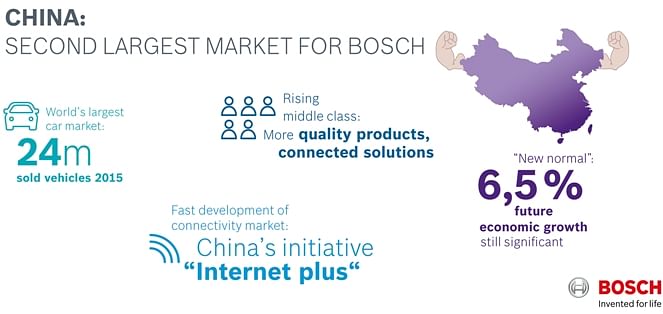Bosch sees connectivity as basis for growth in China
In 2015, Bosch increased its sales in China to 11.1 billion euros (Rs 84,250 crore), achieving a growth of 19 percent.
In 2015, Bosch increased its sales in China to 11.1 billion euros (Rs 84,250 crore). Despite a less dynamic market environment, the supplier of technology and services achieved a nominal sales growth of around 19 percent.
Adjusted for currency effects, sales were up slightly in local currency. Sales in China almost doubled as a result of the full acquisition of the former 50-50 joint ventures BSH Hausgeräte GmbH and Robert Bosch Automotive Steering GmbH. This makes the country the second-largest market for the Bosch Group after Germany. Over the past three years, China’s share of total Bosch Group sales has increased from 9 to 16 percent.
Bosch expects a positive performance in China also for 2016 and sees especially strong potential in the area of connectivity.
Speaking at the local annual press conference in Shanghai Peter Tyroller, member of board of management of Robert Bosch responsible for Asia-Pacific explained, “The Chinese market continues to offer us a wide range of business opportunities. The market for the internet of things (IoT) is also growing rapidly in China. Over the coming years, we expect China to see strong growth in demand for quality products as well as for connected solutions and services. Bosch is well positioned for this.”
He added that this is above all thanks to the ‘Internet Plus’ initiative for integrating the internet into traditional industries – a major element of the Chinese government’s 13th Five-Year Plan, the objective of which is to make the country greener, more open, more innovative, and more sustainable.
‘Local for local’ connectivity strategy
Bosch has been present in China since 1909 and is committed to localisation there. “Our ‘local for local’ strategy in China is paying off, as we can see from our sustained business success in the country. We invested more than 750 million euros (Rs 5,690 crore) in China in 2015, and we are budgeting a similar sum for 2016,” Tyroller said.

Bosch will open a new plant in Wuhu this year for its Car Multimedia division. Tyroller also sees localisation as a recipe for success with connectivity. This is why the Bosch subsidiaries Bosch Software Innovations, Bosch Sensortec, and Bosch Connected Devices and Solutions have been present in the local market for several years. When it comes to connectivity, the company also relies on alliances with local partners such as Tencent, one of the biggest Chinese internet companies. This collaboration will enable local use of the mySPIN smartphone integration solution.
Industry 4.0 leads to increased competition in China
It is above all in connected industry that Bosch sees huge potential in China. “We expect that the use of intelligent and connected solutions in manufacturing will play an increasingly important role in China,” said Tyroller. The key driver for this is the ‘Made in China 2025’ initiative, which is part of the country’s ‘Internet Plus’ action plan. In China, too, the company is pursuing a two-pronged strategy in the area of Industry 4.0: As a supplier, the company offers a range of solutions for the Chinese market in the areas of powertrain technology and automation as well as sensor technology and software. And as a user of Industry 4.0, Bosch is already operating eight pilot projects at its Chinese manufacturing locations in Suzhou, Shanghai, Wuxi, Changsha, Nanjing, Beijing, Changzhou, and Xi’an.

In logistics and inventory, for instance, RFID (radio frequency identification) tags track the route workpieces take through the factory, while reading stations are able to pinpoint the position of the transport crates at any time. It is easy to see what work steps blanks are gradually progressing through and when the products will most likely be finished. That data, in turn, can be used to determine when they will be packaged, shipped, and installed. In the Bosch plant in Suzhou, this has already cut the time needed for inventory by 97 percent, or 440 man-hours.
Bosch among the top software employers in China
In 2015, 30 percent of the 5,000 Bosch researchers and developers in China were working in software development. They will be joined by another 2,500 associates in 2016. Bosch now employs some 55,000 associates in China – 2,000 more than one year ago. This makes the company’s headcount in China the biggest outside Germany.
Banking on Asia-Pacific
Bosch’s story in Asia-Pacific goes back more than a century. In the past five years alone, the company has achieved average sales growth in the region of some 10 percent and invested a total of 4 billion euros (Rs 30,360 crore). With a 27 percent share of total sales revenue, Asia-Pacific remains an important pillar of growth for the Bosch Group. In 2015, its sales in the region rose 17 percent (2.8 percent after adjusting for exchange-rate effects) to 19.2 billion euros (Rs 145,730 crore).
Recommended: Bosch Group restarts business in Iran
RELATED ARTICLES
Isuzu unveils D-Max EV at 2025 Commercial Vehicle Show
Revealed at the 2025 Commercial Vehicle Show in Birmingham, the Isuzu -Max EV is the first fully electric commercial pic...
Hyundai unveils next−gen highly efficient hybrid system
The next-gen hybrid system is claimed to offer 45% better fuel efficiency and 19% more power compared with ICE powertrai...
Horse Powertrain reveals hybrid conversion for electric cars
Engine-making joint venture of Geely and the Renault Group announces new hybrid powertrain that fits into the same space...






 By Autocar Professional Bureau
By Autocar Professional Bureau
 12 May 2016
12 May 2016
 4712 Views
4712 Views









